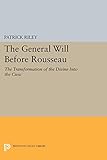The General Will before Rousseau : The Transformation of the Divine into the Civic / Patrick Riley.
Material type: TextSeries: Studies in Moral, Political, and Legal Philosophy ; 465Publisher: Princeton, NJ : Princeton University Press, [2014]Copyright date: ©1986Edition: Course BookDescription: 1 online resource (294 p.)Content type:
TextSeries: Studies in Moral, Political, and Legal Philosophy ; 465Publisher: Princeton, NJ : Princeton University Press, [2014]Copyright date: ©1986Edition: Course BookDescription: 1 online resource (294 p.)Content type: - 9780691606415
- 9781400858187
- 320.011
- JC328.2
- online - DeGruyter
- Issued also in print.
| Item type | Current library | Call number | URL | Status | Notes | Barcode | |
|---|---|---|---|---|---|---|---|
 eBook
eBook
|
Biblioteca "Angelicum" Pont. Univ. S.Tommaso d'Aquino Nuvola online | online - DeGruyter (Browse shelf(Opens below)) | Online access | Not for loan (Accesso limitato) | Accesso per gli utenti autorizzati / Access for authorized users | (dgr)9781400858187 |
Browsing Biblioteca "Angelicum" Pont. Univ. S.Tommaso d'Aquino shelves, Shelving location: Nuvola online Close shelf browser (Hides shelf browser)
Frontmatter -- Contents -- Preface -- Acknowledgments -- One. The General Will Established: From Paul and Augustine to Pascal and Malebranche -- Two. The General Will under Attack: The Criticisms of Bossuet, Fenelon, and Bayle -- Three. The Departure from General Will: Malebranche on Moral Relations, Order, and Occasionalism -- Four. The General Will Socialized: The Contribution of Montesquieu -- Five. The General Will Completed: Rousseau and the Volonté Générale of the Citizen -- Six. A Brief Conclusion -- Index
restricted access online access with authorization star
http://purl.org/coar/access_right/c_16ec
Patrick Riley traces the forgotten roots of Rousseau's concept to seventeenth-century questions about the justice of God. If He wills that all men be saved, does He have a general will that produces universal salvation? And, if He does not, why does He will particularly" that some men be damned? The theological origin of the "general will" was important to Rousseau himself. He uses the language of divinity bequeathed to him by Pascal, Malebranche, Fenelon, and others to dignify, to elevate, and to "save" politics.Originally published in 1986.The Princeton Legacy Library uses the latest print-on-demand technology to again make available previously out-of-print books from the distinguished backlist of Princeton University Press. These editions preserve the original texts of these important books while presenting them in durable paperback and hardcover editions. The goal of the Princeton Legacy Library is to vastly increase access to the rich scholarly heritage found in the thousands of books published by Princeton University Press since its founding in 1905.
Issued also in print.
Mode of access: Internet via World Wide Web.
In English.
Description based on online resource; title from PDF title page (publisher's Web site, viewed 30. Aug 2021)









